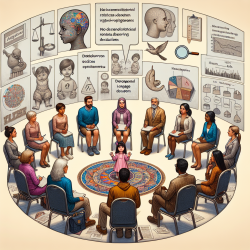Introduction
The COVID-19 pandemic has significantly impacted the mental health and wellness of pre-Kindergarten (pre-K) teachers, as highlighted in the research article "Silent expectations: An exploration of women pre-Kindergarten teachers’ mental health and wellness during COVID-19 and beyond." This study, conducted by Rodriguez et al., delves into the challenges faced by pre-K teachers during the early months of the pandemic and offers insights into how these challenges can inform better support strategies for educators.
Understanding the Impact
The study reveals that pre-K teachers experienced a unique set of stressors during the pandemic, exacerbated by the sudden shift to virtual teaching and the loss of physical interaction with students. These changes disrupted the teacher-student relationship, a critical component of teachers' professional identity and self-efficacy. The research underscores the importance of understanding the relational nature of teaching, particularly for women educators who predominantly make up the early childhood education (ECE) workforce.
Key Findings
- Silent Expectations: Teachers faced both professional and personal expectations to continue their roles despite the challenges posed by the pandemic. These expectations often went unrecognized, leading to increased stress and a sense of being "forgotten" by educational authorities.
- Disequilibrium and Loss: The transition to virtual learning platforms created a sense of loss and disequilibrium among teachers, affecting their ability to maintain close relationships with students. This shift challenged their traditional teaching methods, which rely heavily on physical interaction and emotional connection.
- Mental Health and Wellness: Teachers reported experiencing negative mental health outcomes, including stress, anxiety, and depression. The lack of support systems for teachers' mental health was evident, highlighting the need for targeted interventions and resources.
Implications for Practice
To support pre-K teachers effectively, it is crucial to acknowledge and address the silent expectations placed on them. Educational institutions and policymakers should prioritize teachers' mental health and wellness by implementing trauma-informed care practices and providing resources that focus on both occupational and personal stressors.
Additionally, professional development (PD) programs should be designed to support teachers' identity development and relational skills. Grounding PD in frameworks like the Five Awarenesses of Teaching can help educators better understand their roles and relationships with students, ultimately enhancing their teaching practice.
Encouraging Further Research
While this study provides valuable insights into the experiences of pre-K teachers during the pandemic, further research is needed to explore the long-term effects on teachers' mental health and wellness. Future studies should consider the diverse experiences of teachers across different contexts and develop new measurement tools to assess the impact of crises on educators.
For practitioners interested in improving their skills and understanding the complexities of teaching during a crisis, engaging with this research can offer valuable perspectives and strategies for fostering positive teacher-student relationships and supporting teachers' well-being.
To read the original research paper, please follow this link: Silent expectations: An exploration of women pre-Kindergarten teachers’ mental health and wellness during COVID-19 and beyond.










